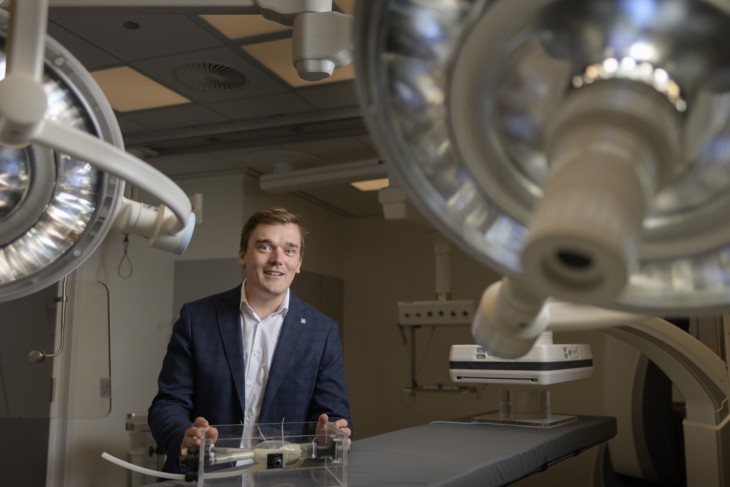The project has received a special type of research funding: the Gravitation Grant, awarded by the Dutch Research Council (NWO) and the Ministry of Education, Culture and Science. "For a full ten years," Noordzij emphasises.
“Most grants last four years, often to fund a PhD project. But given the subject we’re addressing—stress—and the objectives we aim to achieve, this longer timeframe makes sense. Stress is a complex topic that everyone is familiar with but interprets differently. It affects everyone, but for one person, it’s about work; for another, it’s caregiving; and for yet another, it’s about what happens inside their body. Stress can also be both positive and negative. Without stress, life can lack challenges. It’s therefore a multifaceted field of study.”
Noordzij acknowledges that this is not the first research into stress. “However, most of that research is conducted in a laboratory setting where participants are given a stress task. For example, preparing a speech about their strengths and weaknesses and presenting it to a group—known as the Trier Social Stress Test. This increases heart rate but doesn’t provide a reliable basis for predicting who might be more vulnerable to chronic stress-related illnesses.”
Stress in daily life
This is precisely why the new study steps out of the lab, earning the name Stress in Action. Recognising that stress can pose a threat to health, the research team aims to map emotional, cognitive, biological, and behavioural responses to stress in daily life using advanced monitoring and analysis techniques.
“It’s all about real-life research,” says Noordzij. “We use questionnaires about work and relaxation, combined with wearables to measure parameters like heart rate and blood pressure. Smartphones also provide insights—tracking how often someone’s phone is near others can reveal their social context. We want to develop a toolkit to measure stress in this way. For this, we are leveraging existing long-term cohorts like NESDA from Amsterdam UMC, which coordinates the research. These cohorts will be enhanced with our toolkit to follow individuals over time, helping us identify subgroups or factors influencing stress. Ultimately, by the end of the research period, we aim to develop preventive tools and measures.”
The University of Twente’s contribution
The University of Twente’s involvement stems from the fact that Amsterdam UMC’s initial funding request was sent back by NWO with the recommendation to include a partner with specific expertise in medical technology. This is how Noordzij, an expert in studying psychological processes in daily life using technology, became involved.
“That’s exactly why I joined the University of Twente,” says Noordzij. “Here, I’m surrounded by experts in machine learning, health psychology, technology, cognitive science, and data science. The question of how to fully utilise technological possibilities is ingrained in the DNA of everyone at our TechMed Centre. Additionally, the centre has strong ties with relevant companies and healthcare institutions.”
Since joining the University of Twente in 2009, Noordzij has delved into the world of wearables. “I wanted to investigate people’s processes in hospitals and daily life, which led me to wearables and the question of how effective they really are for such research. This is also part of Stress in Action: understanding which wearables are effective for the measurements we need and how to use them properly. Over the ten years of this project, we’ll build a database that will benefit us and provide valuable insights to wearable developers.”
Noordzij’s teaching on compassionate technology adds significant value to the project. “A technology can be efficient but still undermine human values,” he says. “That’s why I want to prioritise and evaluate human values in technology development. People can be resistant to being monitored by technology. Addressing this with compassion can help overcome such barriers. It’s a crucial topic, especially with the growing use of AI in healthcare. This focus on the human side of high-tech solutions is also why our university and, specifically, the Faculty of Behavioural, Management and Social Sciences (BMS) are so engaged with the human touch in technology.”
The ambition for 2025
Stress in Action is still in its early stages. “We’ve been working on it for just under two years,” Noordzij explains. “Our ambition is to deliver the first version of the toolkit by the end of 2025. By then, we want to have initial proposals for measuring heart rate, psychological stress, and cognition. We’re working hard on this. We’ve also recently established a wearables database with forty devices, which we’re systematically analysing for reliability, validity, and usability in various scenarios. We now have a top three, which we’ll test thoroughly in people’s daily lives to evaluate their effectiveness.”
The project is set to conclude in 2032. “By then, we hope to have a clearer picture of which individuals face significant health risks from chronic stress,” Noordzij says. “We aim to develop better stress measurement tools that enable personalised insights into what causes stress for an individual, forming the basis for personalised stress management strategies. Two years ago, the American Heart Association published Life’s Essential 8: eight factors for cardiovascular health. Preventing stress wasn’t one of them, as stress is currently considered too difficult to measure. By 2032, it would be fantastic if we could change that, adding stress prevention as the ninth essential factor, giving general practitioners more to offer than just ‘Try not to stress too much.’”
About Matthijs Noordzij
Professor Matthijs Noordzij is a professor of Health Psychology and Technology at the University of Twente (TechMed Centre, Faculty of BMS). For the Stress in Action research, he collaborates with key partners within the university, including the research groups Cognition, Data & Education (Faculty of BMS), Interaction Design (Faculty of ET), and Biomedical Signals & Systems and Human Media Interaction (both part of the Faculty of EEMCS).




